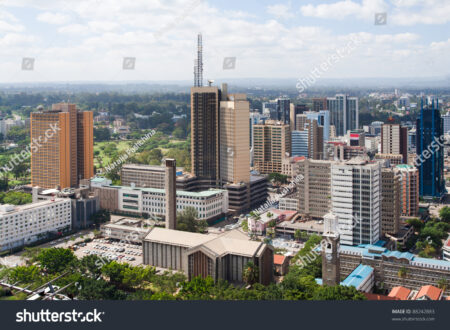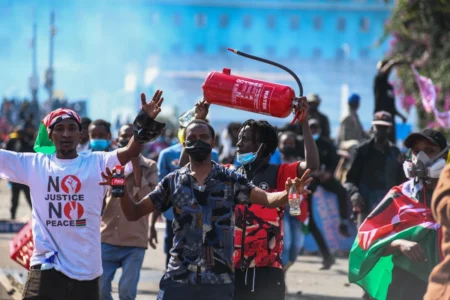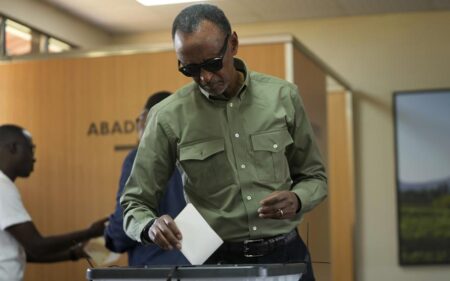- An ongoing diplomatic row in Addis Ababa has prompted the AfDB to withdraw its international expatriates from Ethiopia.
- At the same time, fears of a possible shift of the African Union’s (AU) headquarters from Addis Ababa to Nairobi have been voiced in response to the worsening political situation and growing violence in Ethiopia.
- The current scenario in Ethiopia presents significant obstacles for international organizations that operate within the country.
Circumstances surrounding the AfDB’s withdrawal from Ethiopia
A roiling diplomatic crisis pitting the African Development Bank (AfDB) against authorities in Addis Ababa—the seat of the African Union—has prompted the pan-African lender to relocate its international personnel from Ethiopia in a huff. This hasty decision announced on Wednesday comes months after Ethiopian security forces reportedly mistreated two AfDB staff members in Addis Ababa on October 31, 2023.
Under the direction of a newly designated Officer-in-Charge, the Bank’s Ethiopian office will continue to operate as usual. The Bank has reaffirmed its dedication to the welfare and safety of its Ethiopian employees and has decided to keep them in their current roles.
As per the terms of the Host Country Agreement between the AfDB and the Ethiopian government, two foreign employees of the bank were wrongfully arrested, physically attacked, and held without due process of law.
Upon learning of the situation, Dr. Akinwumi Adesina, President of the AfDB, promptly worked with the Ethiopian authorities to ensure the release of the detained staff. The Bank’s concerns about the Ethiopian government’s failure to provide a thorough inquiry report have persisted since the incident was reported.
As a result, on November 22, Dr. Adesina sent a high-ranking delegation to Addis Ababa to meet with Ethiopian authorities and the AfDB personnel stationed there to review the situation. Due to the ongoing nature of the situation and concerns for staff safety, the decision has been made to temporarily move international staff based on the findings of this delegation.
The Bank is committed to the safety and protection of its employees, Dr. Adesina noted. While the Ethiopian government investigates and takes action against the perpetrators, the international bank workforce will now work remotely.
The current scenario in Ethiopia presents significant obstacles for international organizations that operate within the country. For instance, since the conflict in the Tigray region started in November 2020, it has morphed into a humanitarian catastrophe impacting millions of people. The conflict has strained relations between Ethiopia and numerous foreign organizations, as accusations of mass displacements and human rights abuses intensify.
Additionally, observers and policymakers are wondering whether the Ethiopian government is committed to human rights and democracy based on how it is handling the roiling crisis. A picture of escalating authoritarianism has emerged from reports of media control, the detention of journalists and opposition leaders, and limitations on humanitarian access. These deeds create moral conundrums regarding involvement in the area and impede the work of international organizations in Africa’s second most populous nation.
Read Also: AfDB approves $696.4M financing for Tanzania-Burundi-DRC railway project
Ethiopia’s Humanitarian Crisis
The humanitarian situation in regions impacted by conflicts is now critical. According to UN agencies, there is an immediate need for food, medical aid treatment and supplies, as well as housing for millions of people.
International groups have been greatly hindered in providing adequate relief due to the government’s tight control and occasional shutdowns of telecommunications and transport routes. These limitations worsen both the humanitarian crisis and the ability of these groups to fulfill their missions of helping those in need.
It is also challenging for foreign organizations to guarantee the security of their employees due to regional instability and occasional violent outbreaks. The situation involving the employees of the AfDB serves as an example of the dangers that foreign workers confront today in Ethiopia. As the AfDB decision shows, this condition makes firms with a presence in Ethiopia rethink their operating plans and, in extreme circumstances, consider scaling back, pulling out or relocating employees.
The financial environment for development and humanitarian activities is further complicated by the difficult relations between the Ethiopian government and various international partners, especially Western countries that have historically been essential donors.
The activities of international organizations dependent on this financing may be unintentionally impacted by sanctions and reductions in assistance implemented by these nations in reaction to the conflict and human rights concerns.
Will the African Union headquarters move from Ethiopia?
Fears of a possible move of the African Union’s (AU) headquarters from Addis Ababa to Nairobi have been voiced in response to the worsening political situation and growing violence in Ethiopia. The political and historical implications of such a change are high, considering Addis Ababa’s lengthy tenure as the AU seat and the city’s prominence as a diplomatic center dating back to the organization’s 1963 charter.
Going forward, the AU must weigh any decision based on several circumstances. Priority number one is the protection of AU employees. Some recent events, such as the abuse of AfDB international employees, have cast doubt on the Ethiopian government’s capacity to protect foreign diplomats and expatriates, adding to the mounting sense of unrest in the country.
Second, the AU’s diplomatic and administrative missions depend on an operational environment free from disruptions. The AU’s capacity to carry out its operations efficiently may be hindered by the protracted and seemingly unending conflict in Ethiopia, as well as the government’s creeping authoritarianism, characterized by limitations on civil society and the media.
As a prospective new site, neighbouring Nairobi city presents various benefits, which brings us to our third point. Some UN agencies and other international institutions call Kenya home, and East Africa’s largest economy has a reputation for being one of the safest in the region. Nairobi city is an excellent alternative because of its long history of diplomatic relations and its position as a regional diplomatic, communications, trade and aviation center.
The political ramifications and complexity of relocating the AU headquarters make any such choice difficult. The post-colonial history of Africa is intricately bound up with Addis Ababa’s function as a diplomatic hub, and Ethiopia has long stood as a symbol of African independence and unity. A relocation might dramatically signal the erosion of AU’s influence on the prevailing situation in Ethiopia.
In addition, reaching a unanimous decision among the member nations of the AU could prove to be a formidable challenge. Moving the headquarters also has significant financial and logistical implications. Administrative tasks would have to be relocated, and the procedure would also have to address the underlying diplomatic and legal ramification.
While the potential relocation of the AU’s headquarters to Nairobi remains speculative, Ethiopia’s ongoing conflict and political climate provide a context in which such discussions could gain momentum. Ethiopia’s ongoing conflict and the government’s increasingly authoritarian approach pose significant challenges for international organizations.
These range from operational and logistical difficulties to broader concerns about engagement where democratic and human rights principles are threatened. As the situation evolves, it becomes increasingly imperative for these organizations to navigate these challenges while striving to fulfill their humanitarian and development missions.











